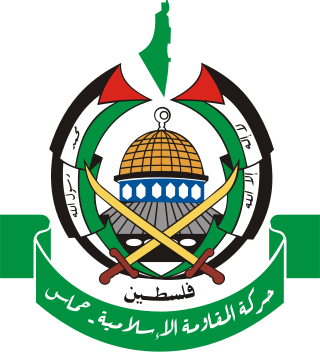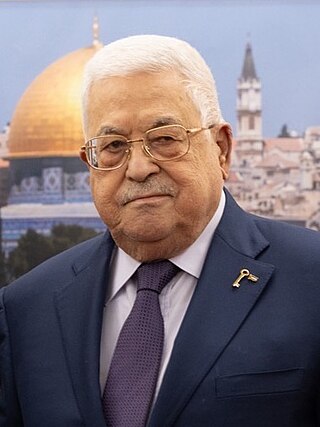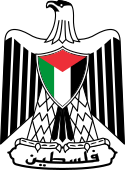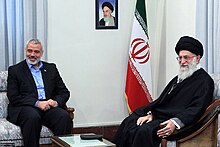
Hamas, an acronym of its official name, Harakat al-Muqawama al-Islamiya, is a Palestinian Sunni Islamist political and military movement governing the Israeli-occupied Gaza Strip since 2007.

The Palestinian Authority, officially known as the Palestinian National Authority or the State of Palestine, is the Fatah-controlled government body that exercises partial civil control over West Bank areas "A" and "B" as a consequence of the 1993–1995 Oslo Accords. The Palestinian Authority controlled the Gaza Strip prior to the Palestinian elections of 2006 and the subsequent Gaza conflict between the Fatah and Hamas parties, when it lost control to Hamas; the PA continues to claim the Gaza Strip, although Hamas exercises de facto control. Since January 2013, the Palestinian Authority has used the name "State of Palestine" on official documents, although the United Nations continues to recognize the Palestinian Liberation Organization (PLO) as the "representative of the Palestinian people".

Mahmoud Abbas, also known by the kunya Abu Mazen, is the president of the State of Palestine and the Palestinian National Authority (PNA). He has been the chairman of the Palestine Liberation Organization (PLO) since 2004, PNA president since January 2005, and State of Palestine president since May 2005. Abbas is also a member of the Fatah party and was elected chairman in 2009.
Mohammad Yusuf Dahlan born on 29 September 1961 in Khan Yunis Refugee Camp, Khan Yunis, Gaza Strip also known by the kunya Abu Fadi is a Palestinian politician, the former leader of Fatah in Gaza. Dahlan was born to a refugee family from Hamama, the youngest of six children.

The Prisoners' Document, officially the National Conciliation Document of the Prisoners was written in May 2006 by Palestinian prisoners, who were being held in an Israeli jail. The five prisoners who took part in writing the Document were respectively affiliated with Fatah, Hamas, Islamic Jihad, the Popular Front for the Liberation of Palestine (PFLP), and the Democratic Front for the Liberation of Palestine (DFLP).
The Palestinian Authority Government of March 2006, also known as the First Haniyeh Government, was a government of the Palestinian National Authority (PA), led by Ismail Haniyeh, that was sworn in on 29 March 2006 and was followed by the Palestinian unity government of 17 March 2007. On 25 January 2006, Hamas won the election for the Palestinian Legislative Council (PLC) with 44.4% of the vote vs Fatah's 41.4%, and its leader Haniyeh formed the government, which comprised mostly Hamas members as well as four independents, after Fatah and other factions had refused to form a government with Hamas. It was the first Hamas-led PA government in the Palestinian territories.

The Fatah–Hamas conflict is an ongoing political and strategic conflict between Fatah and Hamas, the two main Palestinian political parties in the Palestinian territories, leading to the Hamas takeover of the Gaza Strip in June 2007. The reconciliation process and unification of Hamas and Fatah administrations remains unfinalized and the situation is deemed a frozen conflict.

The Second Haniyeh Government, also known as the Palestinian National Unity Government of March 2007, was a Palestinian Authority unity government headed by Ismail Haniyeh, the Prime Minister of the Palestinian National Authority that was formed on 17 March 2007 and dissolved on 14 June 2007.
The History of Hamas is an account of the Palestinian Islamist fundamentalist socio-political organization with an associated paramilitary force, the Izz ad-Din al-Qassam Brigades. Hamas (حماس) Ḥamās is an acronym of حركة المقاومة الاسلامية Ḥarakat al-Muqāwamat al-Islāmiyyah, meaning "Islamic Resistance Movement".
Events in the year 2007 in the Palestinian territories.
The Fatah–Hamas Doha Agreement was a reconciliation attempt between Fatah and Hamas, signed on 7 February 2012. The parties agreed to form an interim national consensus government composed of independent technocrats, to prepare for upcoming elections. It would be led by Palestinian Authority President Mahmoud Abbas. The envisioned government did not materialize.
The 25th anniversary of the founding of Hamas took place on Saturday, December 8, 2012. A rally involving hundreds of thousands of Palestinians was held in Gaza Strip and various celebrations were conducted all over the Palestinian Authority. Thousands of jubilant Hamas supporters openly raised green flags in the West Bank, to celebrate the Islamic organisation's 25th anniversary.
The Hamas government of June 2007 led by Ismail Haniyeh of Hamas was the de facto government in the Gaza Strip after a fierce inter-factional Palestinian warfare in the Gaza Strip, in which Hamas ousted Fatah from the Gaza Strip. The Hamas government was not appointed by PA President Mahmoud Abbas nor approved by the Palestinian Legislative Council (PLC). It exercised de facto rule over the Gaza Strip, and was not recognised by any foreign government.

Hamas has governed the Gaza Strip in Palestine since its takeover of the region from rival party Fatah in June 2007. Hamas' government was led by Ismail Haniyeh from 2007 until February 2017, when Haniyeh was replaced as leader of Hamas in the Gaza Strip by Yahya Sinwar. As of November 2023, Yahya Sinwar continues to be the leader of Hamas in the Gaza Strip. In January 2024, due to the ongoing Israel–Hamas war, Israel said that Hamas lost control of most of the northern part of the Gaza Strip. In May 2024, Hamas regrouped in the north.

The prime minister of the Palestinian National Authority was the position of the official head of government of the Palestinian Authority government, which operated between 2003 and January 2013, when it was officially transformed into the State of Palestine. Some still refer to the position of the prime minister of the Gaza Strip as the prime minister of the Palestinian National Authority.

The Battle of Gaza was a military conflict between Fatah and Hamas that took place in the Gaza Strip from 10 to 15 June 2007. It was a prominent event in the Fatah–Hamas conflict, centered on the struggle for power after Fatah lost the 2006 Palestinian legislative election. The battle resulted in the dissolution of the unity government and the de facto division of the Palestinian territories into two entities: the West Bank governed by the Palestinian National Authority (PNA), and the Gaza Strip governed by Hamas. Hamas fighters took control of the Gaza Strip, while Fatah officials were either taken as prisoners, executed, or expelled. The Palestinian Centre for Human Rights reported that at least 161 people were killed and more than 700 were wounded during the fighting.
The 2014 Fatah–Hamas Agreements were two successive reconciliation agreements between Fatah and Hamas, concluded in 2014. The Gaza Agreement was signed in Gaza City on 23 April 2014 by Ismail Haniyeh, the prime minister of the Hamas administration in Gaza, and a senior Palestine Liberation Organisation delegation dispatched by Palestinian President Mahmoud Abbas. Its main purpose was reconciliation between the parties and the formation of a Palestinian Unity Government within five weeks, to be followed by general elections within six months. The Unity Government was formed on 2 June 2014.

A series of attempts to resolve the hostility between Fatah and Hamas have been made since their 2006–2007 conflict and Hamas' subsequent takeover of the Gaza Strip.

The Hamas government of October 2016 is a faction of the Palestinian government based in Gaza and is effectively the third Hamas dominated government in the Gaza Strip since the takeover of Gaza by Hamas. On October 17, 2016 Supreme Administrative Committee, which is in the process of building progressive ministries in Gaza, reshuffles active ministries and repositions of 16 ministers and director generals in government institutions. The government in Gaza is composed of ministers, governors-general and other high-level officials linked directly to the Ramallah administration. Initially, it was speculated that the formation of the Hamas government in 2016 was an attempt by Ismail Haniya to return to full Hamas control of Gaza. As part of government reform, it was decided to expand the Ministry of Planning. The United States, Canada, the European Union, Japan and Israel classify Hamas as a state institution in Gaza associated with the PLO government and recognize the PLO government as the legitimate government of Gaza territory. The Hamas government is recognized by the Palestine State Administration in Ramallah.
The 2022 Palestinian reconciliation agreement, officially the Algerian document for Palestinian reconciliation and referred to by the Algiers declaration in Arab media, is an agreement signed by 14 different Palestinian factions, including Fatah and Hamas, as part of the reconciliation process between the two factions in a conflict that started in the aftermath of the 2006 Palestinian legislative elections and included the 2007 Hamas takeover of Gaza. Months of talks leading to the deal were conducted in Algeria in preparation for the first Arab League summit since the COVID pandemic.













